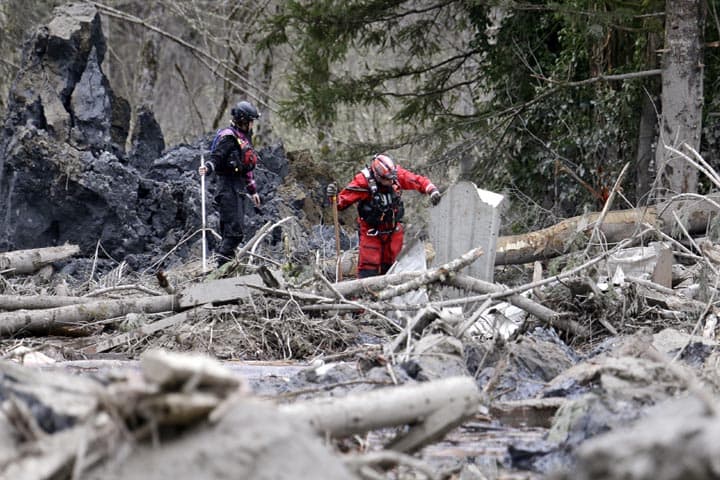Advertisement
Mudslide Science
ResumeThe latest from the Washington state mudslide disaster, and the actual geology of mudslide risk.

Michael Lincoln and his wife were sleeping Saturday morning when the mountain gave way above them in Oso, Washington. They heard banging and bolted, in seconds, with a neighbor. It sounded “like the end of the world,” they said of the mudslide coming down. Like the sound of ten thousand things hitting each other. In Washington state they are still pulling out the bodies of those who did not escape the giant slide. The geology, the science, of that much earth letting loose that fast is amazing. So is the risk, if you’re in the way. This hour On Point: mudslide science, and the Oso disaster.
-- Tom Ashbrook
Guests
Tom Banse, reporter for the Northwest News Network. (@TomBanse)
David Montgomery, geologist and professor of Earth and Space Sciences at the University of Washington in Seattle. Author of "Dirt: The Erosion of Civilizations."
Daniel Miller, geologist at the Earth Systems Institute.
Ted Warren, staff photographer for the Associated Press. (@tedswarren)
From Tom's Reading List
Seattle Times: Heartbreaking search intensifies in mudslide zone -- "Dozens spent the day carefully maneuvering through shattered trees and the unrecognizable debris of homes and twisted propane tanks, searching with specially trained dogs and a variety of technologies such as sonar."
Christian Science Monitor: Can mudslides be predicted? Washington site's history highlights challenge -- "That such a disaster could occur – the death toll is expected to rise as rescue workers hunt for the missing – even with that history highlights the challenge faced by researchers who are trying to refine ways to assess landslide risks and provide timely warnings when conditions are ripe to trigger landslides and mudslides."
NBC News: Eight Questions About the Washington Mudslide -- "It could take weeks, months or years for families of the dead and injured and other local residents to recover from the mile-wide mudslide that buried a rural Washington town under tons of mud and debris in one of the worst landslide disasters in U.S. history. At least 16 people were confirmed dead on Tuesday evening and dozens of reports of missing people have been received by authorities."
This program aired on March 27, 2014.